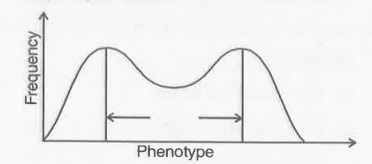The unit of natural selection is :
Individual
Population
Species
Mutation
The correct Answer is:A
To solve the question "The unit of natural selection is:", we need to analyze the options provided and understand the concept of natural selection.
1. Understanding Natural Selection:
- Natural selection is a process described by Charles Darwin, which explains how certain traits become more or less common in a population over time. It is a gradual process where individuals with advantageous traits are more likely to survive and reproduce.
2. Identifying the Units of Natural Selection:
- The unit of natural selection refers to the biological entity that is subject to the process of natural selection. This could be a gene, an individual organism, a population, or even a species.
3. Evaluating the Options:
- Option 1: Individual: This option suggests that the individual organism is the unit of natural selection. Since natural selection acts on individuals based on their traits, this option is a strong contender.
- Option 2: Population: While populations are affected by natural selection, the selection occurs at the level of individuals within that population.
- Option 3: Species: A species is a broader category and is not the immediate unit of natural selection.
- Option 4: Mutation: Mutations are changes in genetic material that can lead to variations; however, they are not units of natural selection themselves.
4. Conclusion:
- Based on the understanding that natural selection acts on individuals, the correct answer is Option 1: Individual. This means that the unit of natural selection is the individual organism.
Final Answer:
The unit of natural selection is Individual.
---
- Natural selection is a process described by Charles Darwin, which explains how certain traits become more or less common in a population over time. It is a gradual process where individuals with advantageous traits are more likely to survive and reproduce.
- The unit of natural selection refers to the biological entity that is subject to the process of natural selection. This could be a gene, an individual organism, a population, or even a species.
- Option 1: Individual: This option suggests that the individual organism is the unit of natural selection. Since natural selection acts on individuals based on their traits, this option is a strong contender.
- Option 2: Population: While populations are affected by natural selection, the selection occurs at the level of individuals within that population.
- Option 3: Species: A species is a broader category and is not the immediate unit of natural selection.
- Option 4: Mutation: Mutations are changes in genetic material that can lead to variations; however, they are not units of natural selection themselves.
- Based on the understanding that natural selection acts on individuals, the correct answer is Option 1: Individual. This means that the unit of natural selection is the individual organism.
The unit of natural selection is Individual.
Topper's Solved these Questions
- EVOLUTIONBOOK - CENGAGE BIOLOGY ENGLISHCHAPTER - EVOLUTIONEXERCISE - Exercise Assertion-Reasoning Question.
25 Videos
- EVOLUTIONBOOK - CENGAGE BIOLOGY ENGLISHCHAPTER - EVOLUTIONEXERCISE - Archives
38 Videos
- ENVIRONMENTAL ISSUESBOOK - CENGAGE BIOLOGY ENGLISHCHAPTER - ENVIRONMENTAL ISSUESEXERCISE - ARCHIVES
45 Videos
- HUMAN HEALTH AND DISEASEBOOK - CENGAGE BIOLOGY ENGLISHCHAPTER - HUMAN HEALTH AND DISEASEEXERCISE - ARCHIVES
46 Videos
Similar Questions
Knowledge Check
The theory of natural selection was given by
ALamarckBAlfred WallceCCharles DarwinDOparin and Haldane.
Which of the following graphs shows the type of natural selection which favours polymorphisms ?
View SolutionWhich type of natural selection is depicted in the diagram given below?

View SolutionTheory of natural selection dwells on
View SolutionWhich type of natural selection in a population is rare in occurrence than others ?
View SolutionIn which type of natural selection does the peak get higher and narrower ?
View SolutionThe idea of Natural Selection as the fundamental process of evolutionary change was reached
View SolutionWhich of the following scientists believed in the concept of natural selection like Darwin?
View Solution
